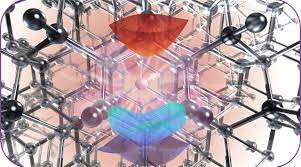In the pursuit of quantum computing and networking, researchers face the challenge of identifying materials capable of storing and transmitting quantum information reliably. In a groundbreaking study published in the Journal of the American Chemical Society, Professor Daniel Shoemaker and graduate student Zachary Riedel from the University of Illinois Urbana Champaign have made significant strides in this endeavor by exploring the design principles and synthesis of quantum memory candidates.
Quantum computers and networks require components fundamentally different from conventional systems. To address this need, Shoemaker and Riedel turned their focus to rare earth elements, particularly europium (Eu), renowned for their unique atomic structures. Leveraging density functional theory DFT calculations, they identified potential Eu compounds for serving as a new quantum memory platform.
The key objective was to find a material capable of storing quantum information over extended periods without degradation. Rare earth ions, densely clustered close to the nucleus, offer promising properties for this purpose. By exciting these electrons, long-lived states crucial for preserving quantum information can be achieved, positioning rare earth ions as strong candidates for qubits.
However, the search for suitable materials presented unique challenges due to the nascent nature of quantum information research. Shoemaker and Riedel established stringent criteria, including the use of Eu3+ configuration for optimal optical wavelength and transparency, single-isotope elements to prevent information scrambling, and sufficient separation between europium ions to minimize unintended interactions.
Through meticulous computational screening and synthesis efforts, Riedel successfully identified and produced a novel compound, Cs2NaEuF6, adhering to the established design rules. Notably, this air-stable compound holds promise for scalable quantum computing, as it can be seamlessly integrated with other components.
Furthermore, DFT calculations unveiled several other prospective compounds awaiting synthesis, underscoring the vast potential of unknown materials in quantum information storage. Shoemaker emphasizes the efficiency of their approach in predicting stable candidates and demonstrates the feasibility of synthesizing these materials for practical applications.
The findings from this research not only expand our understanding of quantum memory design but also pave the way for future advancements in quantum computing technology. As Shoemaker and Riedel continue their exploration, they aim to unlock the full potential of these materials and propel the development of robust quantum information systems.
Through their interdisciplinary efforts, Professor Daniel Shoemaker and Zachary Riedel have illuminated a pathway towards harnessing the power of quantum mechanics for transformative computing capabilities. Their groundbreaking work represents a significant step forward in the quest for practical quantum computing solutions, promising a future where quantum information storage is not just a possibility but a reality.
